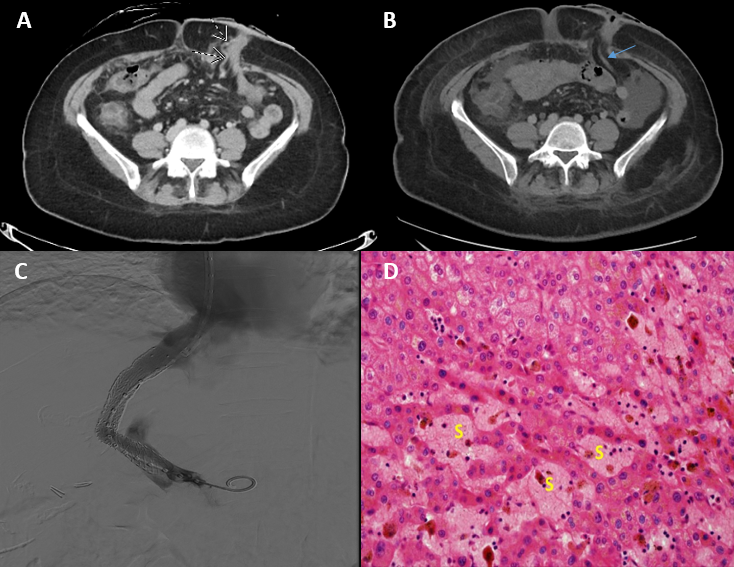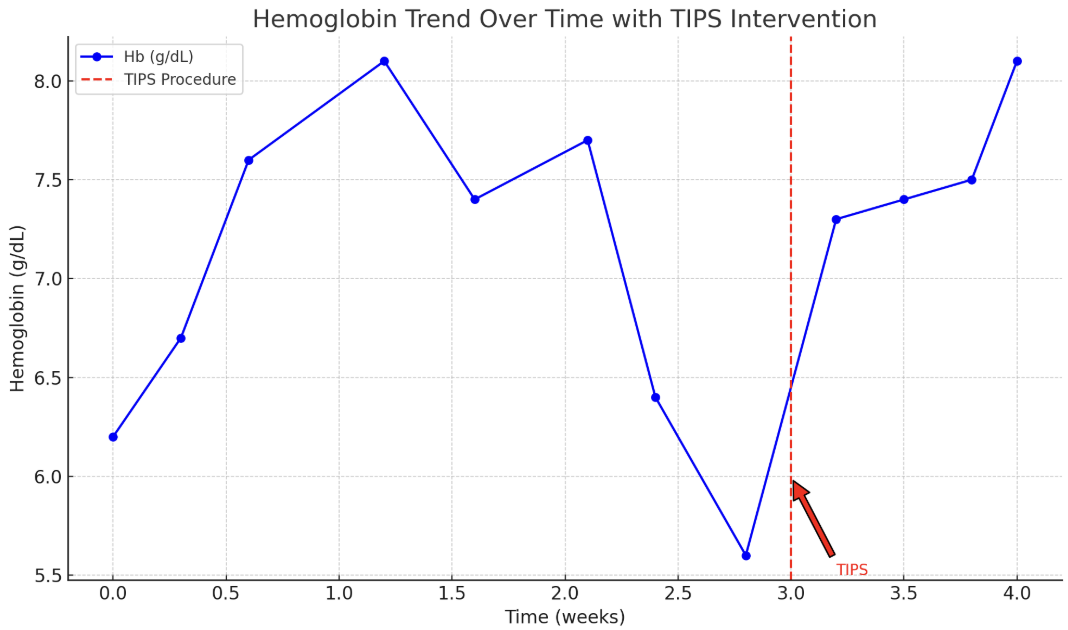Sunday Poster Session
Category: Liver
P1777 - Successful Management of Oxaliplatin-Induced Nodular Regenerative Hyperplasia and Non-Cirrhotic Portal Hypertension With TIPS in a Patient With Recurrent Ostomy Bleeding
Sunday, October 26, 2025
3:30 PM - 7:00 PM PDT
Location: Exhibit Hall

Bianca Thakkar, DO
University of Connecticut Health
Farmington, CT
Presenting Author(s)
Bianca Thakkar, DO1, Karim Al Annan, MD2, Ismail Ghafary, MD3, Roopjeet Bath, MBBS1
1University of Connecticut Health, Farmington, CT; 2University of Connecticut Health Center, Hartford, CT; 3University of Connecticut Health Center, Farmington, CT
Introduction: Nodular regenerative hyperplasia (NRH) is an increasingly recognized hepatic complication of oxaliplatin-based chemotherapy, leading to non-cirrhotic portal hypertension (NCPH). Patients may present with ascites, varices, or gastrointestinal bleeding in the absence of cirrhosis. Management is particularly difficult when bleeding originates from ectopic varices, such as peristomal varices, which are rare and often refractory to medical therapy.
Case Description/
Methods: A 51-year-old woman with rectal adenocarcinoma treated with oxaliplatin-based chemoradiation and proctectomy with permanent end colostomy presented with recurrent peristomal bleeding. She had biopsy-confirmed oxaliplatin-induced NRH and NCPH, along with ascites and esophageal varices managed with carvedilol. Endoscopy and colonoscopy showed portal hypertensive enteropathy but no active bleeding. Imaging revealed peristomal varices, presumed to be the bleeding source. Intravenous octreotide was initiated but failed to control the bleeding. She ultimately underwent a transjugular intrahepatic portosystemic shunt (TIPS), which resulted in complete resolution.
Discussion: This case highlights a rare but serious complication of oxaliplatin-induced NRH and underscores the diagnostic and therapeutic challenges in managing NCPH. Peristomal varices, an uncommon manifestation of portal hypertension, are frequently missed on routine endoscopy. In this case, failure of medical therapy led to TIPS placement, which effectively decompressed the portal system and resolved bleeding. While TIPS is a standard intervention for cirrhotic portal hypertension, its role in NCPH is less well-defined. However, it should be considered in patients with severe complications such as ectopic varices.
To our knowledge, this is the first reported case of refractory bleeding from peristomal varices due to oxaliplatin-induced NRH successfully treated with TIPS. This supports use of TIPS as a definitive therapy in selected NCPH patients. Early recognition of NRH and timely portal decompression may optimize outcomes.
In conclusion, TIPS offers an effective alternative for managing severe portal hypertension complications in NCPH patients with preserved renal function and limited comorbidities. Higher serum creatinine, refractory ascites, and severe extrahepatic conditions are associated with worse outcomes.
References:
1. Kashyap R, Reddy J, Varkey B. StatPearls. January 2024. Pericardial Effusion. Treasure Island (FL): StatPearls Publishing; 2024 Jan–.

Figure: Figure 1:
A. Contrast-enhanced CT image demonstrating peristomal varices (outlined by dashed arrow) adjacent to the end colostomy site.
B. Follow-up CT scan after TIPS placement showing rapid improvement of the peristomal varices (blue arrow).
C. Fluoroscopic image confirming successful deployment and patency of the TIPS.
D. Histopathology example of NRH on liver biopsy, consistent with oxaliplatin exposure. Hematoxylin and eosin (H&E) stain shows dilated, congested sinusoids (labeled "S"). Magnification: 400X [1].

Figure: Hemoglobin (Hb) trend over time (weeks). Recurrent bleeding with transfusion dependence resolved after TIPS, with stable Hb thereafter.
Disclosures:
Bianca Thakkar indicated no relevant financial relationships.
Karim Al Annan indicated no relevant financial relationships.
Ismail Ghafary indicated no relevant financial relationships.
Roopjeet Bath indicated no relevant financial relationships.
Bianca Thakkar, DO1, Karim Al Annan, MD2, Ismail Ghafary, MD3, Roopjeet Bath, MBBS1. P1777 - Successful Management of Oxaliplatin-Induced Nodular Regenerative Hyperplasia and Non-Cirrhotic Portal Hypertension With TIPS in a Patient With Recurrent Ostomy Bleeding, ACG 2025 Annual Scientific Meeting Abstracts. Phoenix, AZ: American College of Gastroenterology.
1University of Connecticut Health, Farmington, CT; 2University of Connecticut Health Center, Hartford, CT; 3University of Connecticut Health Center, Farmington, CT
Introduction: Nodular regenerative hyperplasia (NRH) is an increasingly recognized hepatic complication of oxaliplatin-based chemotherapy, leading to non-cirrhotic portal hypertension (NCPH). Patients may present with ascites, varices, or gastrointestinal bleeding in the absence of cirrhosis. Management is particularly difficult when bleeding originates from ectopic varices, such as peristomal varices, which are rare and often refractory to medical therapy.
Case Description/
Methods: A 51-year-old woman with rectal adenocarcinoma treated with oxaliplatin-based chemoradiation and proctectomy with permanent end colostomy presented with recurrent peristomal bleeding. She had biopsy-confirmed oxaliplatin-induced NRH and NCPH, along with ascites and esophageal varices managed with carvedilol. Endoscopy and colonoscopy showed portal hypertensive enteropathy but no active bleeding. Imaging revealed peristomal varices, presumed to be the bleeding source. Intravenous octreotide was initiated but failed to control the bleeding. She ultimately underwent a transjugular intrahepatic portosystemic shunt (TIPS), which resulted in complete resolution.
Discussion: This case highlights a rare but serious complication of oxaliplatin-induced NRH and underscores the diagnostic and therapeutic challenges in managing NCPH. Peristomal varices, an uncommon manifestation of portal hypertension, are frequently missed on routine endoscopy. In this case, failure of medical therapy led to TIPS placement, which effectively decompressed the portal system and resolved bleeding. While TIPS is a standard intervention for cirrhotic portal hypertension, its role in NCPH is less well-defined. However, it should be considered in patients with severe complications such as ectopic varices.
To our knowledge, this is the first reported case of refractory bleeding from peristomal varices due to oxaliplatin-induced NRH successfully treated with TIPS. This supports use of TIPS as a definitive therapy in selected NCPH patients. Early recognition of NRH and timely portal decompression may optimize outcomes.
In conclusion, TIPS offers an effective alternative for managing severe portal hypertension complications in NCPH patients with preserved renal function and limited comorbidities. Higher serum creatinine, refractory ascites, and severe extrahepatic conditions are associated with worse outcomes.
References:
1. Kashyap R, Reddy J, Varkey B. StatPearls. January 2024. Pericardial Effusion. Treasure Island (FL): StatPearls Publishing; 2024 Jan–.

Figure: Figure 1:
A. Contrast-enhanced CT image demonstrating peristomal varices (outlined by dashed arrow) adjacent to the end colostomy site.
B. Follow-up CT scan after TIPS placement showing rapid improvement of the peristomal varices (blue arrow).
C. Fluoroscopic image confirming successful deployment and patency of the TIPS.
D. Histopathology example of NRH on liver biopsy, consistent with oxaliplatin exposure. Hematoxylin and eosin (H&E) stain shows dilated, congested sinusoids (labeled "S"). Magnification: 400X [1].

Figure: Hemoglobin (Hb) trend over time (weeks). Recurrent bleeding with transfusion dependence resolved after TIPS, with stable Hb thereafter.
Disclosures:
Bianca Thakkar indicated no relevant financial relationships.
Karim Al Annan indicated no relevant financial relationships.
Ismail Ghafary indicated no relevant financial relationships.
Roopjeet Bath indicated no relevant financial relationships.
Bianca Thakkar, DO1, Karim Al Annan, MD2, Ismail Ghafary, MD3, Roopjeet Bath, MBBS1. P1777 - Successful Management of Oxaliplatin-Induced Nodular Regenerative Hyperplasia and Non-Cirrhotic Portal Hypertension With TIPS in a Patient With Recurrent Ostomy Bleeding, ACG 2025 Annual Scientific Meeting Abstracts. Phoenix, AZ: American College of Gastroenterology.
